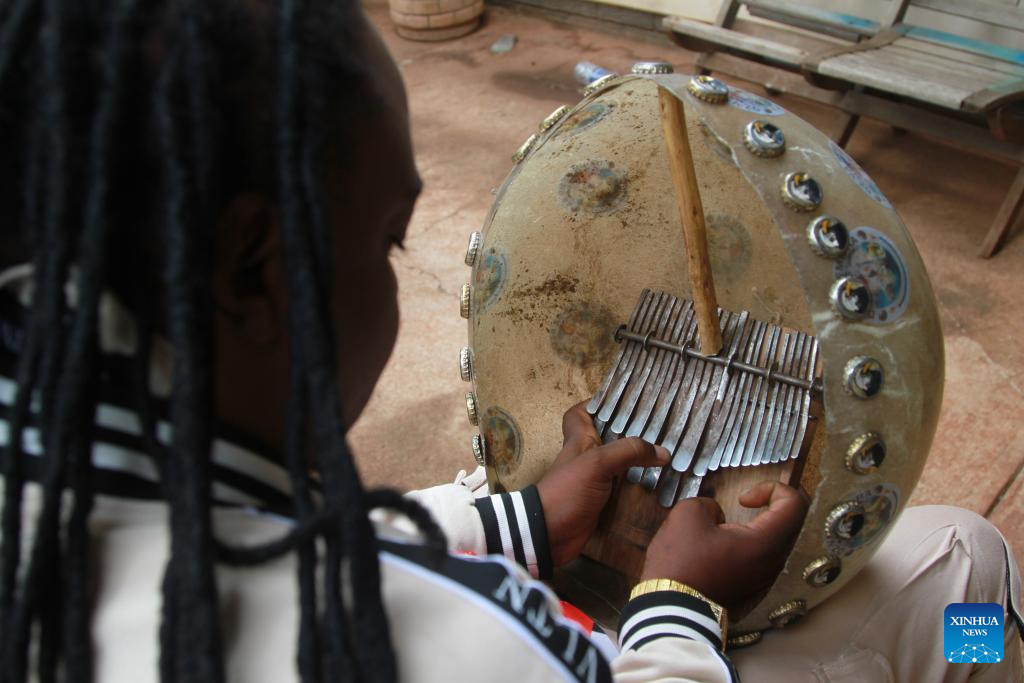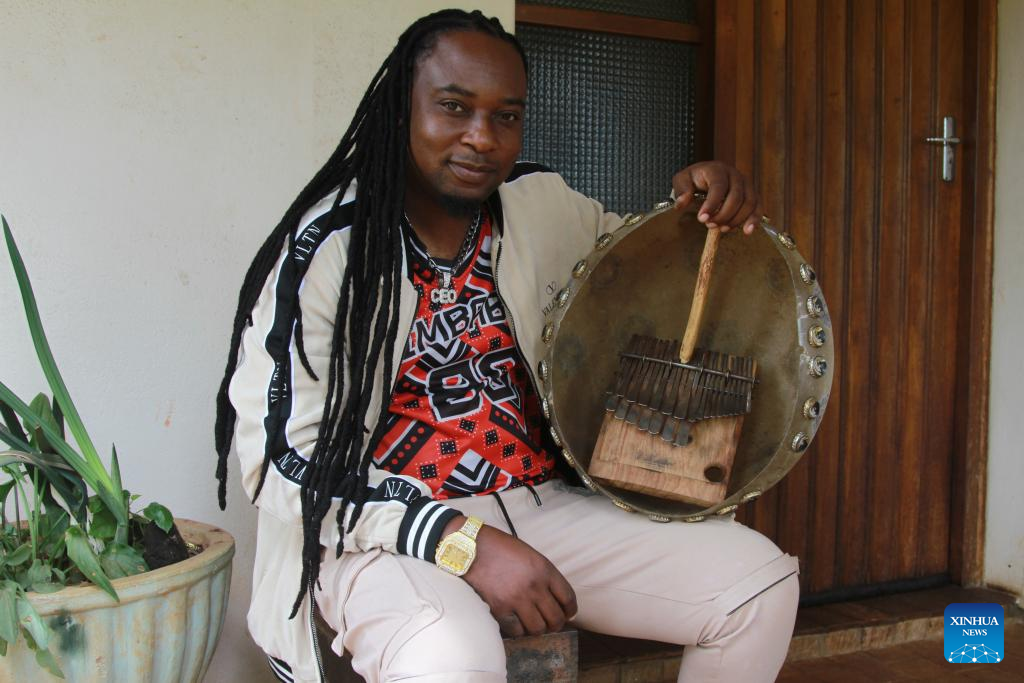
Virimai Nhedega plays the Mbira in Harare, Zimbabwe, on Jan. 20, 2025.(Xinhua/Tafara Mugwara)
HARARE, Jan. 25 (Xinhua) -- A sense of cultural pride filled the club as Virimai Nhedega enchanted his fans with the rhythmic melodies of the Mbira, a traditional Zimbabwean musical instrument celebrated for its unique timbre.
The 38-year-old musician, popularly known as Vee Mhofu, is a renowned Mbira player. The instrument, preserved for more than a thousand years by the Shona people, who make up the majority of Zimbabwe's population, holds deep cultural and spiritual significance.
Nhedega and his Dziva ReMbira traditional music ensemble recently captivated hundreds of fans at a club in Harare with a mesmerizing performance. The ensemble delivered a harmonious blend of vocals and instruments, including the Mbira, traditional drums and the hosho, a gourd rattle filled with seeds that often accompanies the Mbira.
"To me, the Mbira is an important spiritual instrument that we inherited from our ancestors. It is something we must safeguard and promote," Nhedega told Xinhua in an interview at his base in Harare.
Nhedega's journey with the Mbira began at the age of 12, when he discovered the instrument under water while swimming in a river. Fascinated, he took it home and taught himself to play, eventually becoming a skilled musician. The discovery inspired the name of his band, Dziva ReMbira, which means "pool of Mbira" in the Shona language.
Today, Nhedega is a celebrated Mbira player who is modernizing the genre by blending traditional and contemporary elements.
The Mbira, sometimes referred to as a "thumb piano," is a handheld soundboard made of wood with metal keys that are plucked to produce sound. To amplify its resonance, it is often placed inside a large calabash resonator.
In Zimbabwe, the Mbira is more than just an instrument of entertainment. It is considered a vital link to the past, often described as a "telephone to the ancestors." Traditionally, it has been played during celebrations such as weddings and the installation of traditional leaders. In modern times, it features at concerts, corporate events and government functions.
In recognition of its cultural importance, Zimbabwe hosted the inaugural Mbira Festival at Gwanzura Stadium in Harare last September, with thousands in attendance. The month was officially designated as "Mbira Month."
Nhedega said that the Mbira is gaining global recognition and has become a cultural symbol for Zimbabwean tourism.
"We are hosting tourists who come to appreciate Mbira, sometimes for over a month. We are appealing to tourism officials to acknowledge the cultural significance of Mbira. I believe that is why UNESCO has inscribed Mbira as an intangible cultural heritage of humanity," he said.
With growing cultural exchanges between Zimbabwe and China, Nhedega hopes to promote Mbira culture in Asia.
"I look forward to performing live in Asian countries like China. Promoters interested in bringing us to China should reach out so we can participate in cultural exchanges and perform at Chinese festivals," he said.
Having played a pivotal role in popularizing Mbira music, Nhedega's next ambition is to teach the instrument to younger generations, ensuring that its cultural legacy endures.
"We are like fish in water when it comes to culture. We should not abandon it. Within our culture is Mbira music -- our heritage, which we should cherish and embrace," he said.
Raphael Chikukwa, executive director of the National Gallery of Zimbabwe, emphasized the importance of celebrating the Mbira. "The Mbira is not just a musical instrument. It is deeply spiritual and an art form. As a key intangible cultural heritage of Zimbabwe and the region, it deserves recognition both locally and globally," Chikukwa told Xinhua.
Emily Jesaya, Zimbabwe's deputy minister of sports, recreation, arts and culture, highlighted the instrument's role in cultural diplomacy. "It is essential to promote our cultural instruments internationally, so they are recognized at both regional and global levels. This not only places our country on the map but also ensures that our cultural heritage is celebrated worldwide," she said.
Despite its historical significance, years of colonial rule undermined the cultural value of the Mbira. However, through government initiatives and the efforts of contemporary artists championing tradition, the Mbira has seen a resurgence. The genre now enjoys a growing following among both older and younger audiences, including those who once disregarded traditional music.
Today, the name Vee Mhofu has become synonymous with the revival of Mbira music.
"Vee Mhofu's Mbira has a unique and special presence. It draws you into its mood, making it impossible not to move and dance to its rhythm," said Lionel Nhachi, a 26-year-old Mbira fan from Harare. ■

Virimai Nhedega shows a Mbira in Harare, Zimbabwe, on Jan. 20, 2025.(Xinhua/Tafara Mugwara)



